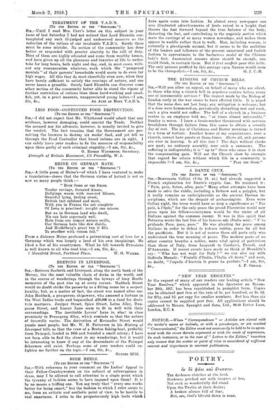A DANTE CRUX.
/TO THE EDITOR OF THE " SPECTATOR.")
SIR,—Benvenuto Cellini (Vita II. xi.) had already suggested a French explanation for Dante's cryptic line. He rendered it: "Paix, pair, Satan, allez, paix." Many other attempts have been made to solve the riddle, including a Hebrew and a polyglot, but it really remains as undecipherable as the ancient Iberian in- scriptions, which aro the despair of archaeologists. Even were Cellini right, the verse would have as deep a significance as " Pas paix, it l'epee," for the only peace the proud Florentine would now press upon his fellow-countrymen would be the union of all Italians against the common enemy. It was in this spirit that Petrarca wrote the last line of his famous ode (Italia mia): " I' vo gridando Pace, pace, pace." He was pleading for peace among Italians in order to defeat la tedcsca rabbia, peace fox all but the pacificists. But it is not of course these old poets only who understood the true meaning of peace. The modern poets of no other country breathe a nobler, more vital spirit of patriotism than those of Italy, from Leopardi to Carducci, Pascoli, and D'Annunzio. If recent events have made us think of Meredith's cry : " Who has not wept for Italy ? " we can also say with Goitre& Mameli: "Fratelli d'Italia, s'e desta," and soon, no doubt, " l'aquila d'Austria le penne ha perdute."—I am, Sir,


























 Previous page
Previous page